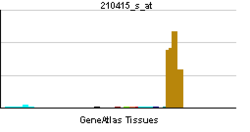- ODF2
-
Outer dense fiber of sperm tails 2 Identifiers Symbols ODF2; CT134; FLJ44866; MGC111096; MGC9034; ODF2/1; ODF2/2; ODF84 External IDs OMIM: 602015 MGI: 1098824 HomoloGene: 1907 GeneCards: ODF2 Gene Gene Ontology Molecular function • structural molecule activity
• protein bindingCellular component • spindle pole
• cytoplasm
• centrosome
• centriole
• cytosol
• cytoskeleton
• microtubule
• ciliumBiological process • G2/M transition of mitotic cell cycle
• mitotic cell cycle
• multicellular organismal development
• spermatogenesis
• cell differentiationSources: Amigo / QuickGO RNA expression pattern 
More reference expression data Orthologs Species Human Mouse Entrez 4957 18286 Ensembl ENSG00000136811 ENSMUSG00000026790 UniProt Q5BJF6 n/a RefSeq (mRNA) NM_001242352.1 XM_990936 RefSeq (protein) NP_001229281.1 XP_996030 Location (UCSC) Chr 9:
131.22 – 131.26 MbChr 2:
29.71 – 29.75 MbPubMed search [1] [2] Outer dense fiber protein 2, also known as cenexin, is a protein that in humans is encoded by the ODF2 gene.[1][2][3]
The outer dense fibers are cytoskeletal structures that surround the axoneme in the middle piece and principal piece of the sperm tail. The fibers function in maintaining the elastic structure and recoil of the sperm tail as well as in protecting the tail from shear forces during epididymal transport and ejaculation. Defects in the outer dense fibers lead to abnormal sperm morphology and infertility. This gene encodes one of the major outer dense fiber proteins. Multiple protein isoforms are encoded by transcript variants of this gene; however, not all isoforms and variants have been fully described.[3]
References
- ^ Shao X, Tarnasky HA, Schalles U, Oko R, van der Hoorn FA (Apr 1997). "Interactional cloning of the 84-kDa major outer dense fiber protein Odf84. Leucine zippers mediate associations of Odf84 and Odf27". J Biol Chem 272 (10): 6105–13. doi:10.1074/jbc.272.10.6105. PMID 9045620.
- ^ Shao X, Murthy S, Demetrick DJ, van der Hoorn FA (Mar 1999). "Human outer dense fiber gene, ODF2, localizes to chromosome 9q34". Cytogenet Cell Genet 83 (3–4): 221–3. doi:10.1159/000015183. PMID 10072582.
- ^ a b "Entrez Gene: ODF2 outer dense fiber of sperm tails 2". http://www.ncbi.nlm.nih.gov/sites/entrez?Db=gene&Cmd=ShowDetailView&TermToSearch=4957.
Further reading
- Kierszenbaum AL (2002). "Keratins: unraveling the coordinated construction of scaffolds in spermatogenic cells". Mol. Reprod. Dev. 61 (1): 1–2. doi:10.1002/mrd.1124. PMID 11774369.
- Hoyer-Fender S, Petersen C, Brohmann H, et al. (1999). "Mouse Odf2 cDNAs consist of evolutionary conserved as well as highly variable sequences and encode outer dense fiber proteins of the sperm tail". Mol. Reprod. Dev. 51 (2): 167–75. doi:10.1002/(SICI)1098-2795(199810)51:2<167::AID-MRD6>3.0.CO;2-O. PMID 9740324.
- Petersen C, Füzesi L, Hoyer-Fender S (1999). "Outer dense fibre proteins from human sperm tail: molecular cloning and expression analyses of two cDNA transcripts encoding proteins of approximately 70 kDa". Mol. Hum. Reprod. 5 (7): 627–35. doi:10.1093/molehr/5.7.627. PMID 10381817.
- Strausberg RL, Feingold EA, Grouse LH, et al. (2003). "Generation and initial analysis of more than 15,000 full-length human and mouse cDNA sequences". Proc. Natl. Acad. Sci. U.S.A. 99 (26): 16899–903. doi:10.1073/pnas.242603899. PMC 139241. PMID 12477932. http://www.pubmedcentral.nih.gov/articlerender.fcgi?tool=pmcentrez&artid=139241.
- Ota T, Suzuki Y, Nishikawa T, et al. (2004). "Complete sequencing and characterization of 21,243 full-length human cDNAs". Nat. Genet. 36 (1): 40–5. doi:10.1038/ng1285. PMID 14702039.
- Beausoleil SA, Jedrychowski M, Schwartz D, et al. (2004). "Large-scale characterization of HeLa cell nuclear phosphoproteins". Proc. Natl. Acad. Sci. U.S.A. 101 (33): 12130–5. doi:10.1073/pnas.0404720101. PMC 514446. PMID 15302935. http://www.pubmedcentral.nih.gov/articlerender.fcgi?tool=pmcentrez&artid=514446.
- Soung NK, Kang YH, Kim K, et al. (2007). "Requirement of hCenexin for proper mitotic functions of polo-like kinase 1 at the centrosomes". Mol. Cell. Biol. 26 (22): 8316–35. doi:10.1128/MCB.00671-06. PMC 1636773. PMID 16966375. http://www.pubmedcentral.nih.gov/articlerender.fcgi?tool=pmcentrez&artid=1636773.
Categories:- Human proteins
- Chromosome 9 gene stubs
Wikimedia Foundation. 2010.
